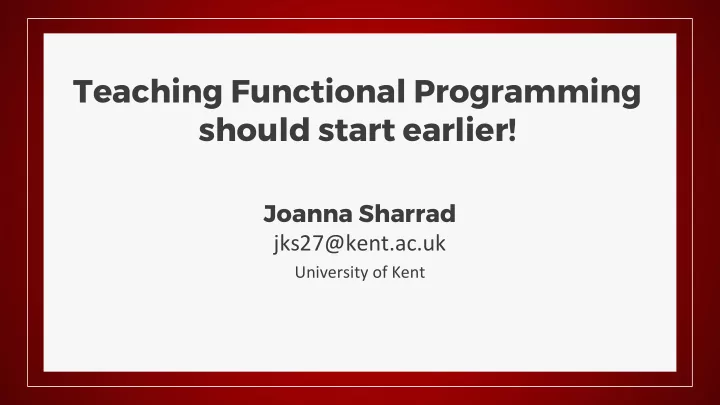

Teaching Functional Programming should start earlier! Joanna Sharrad jks27@kent.ac.uk University of Kent
Background ▫ Worked in secondary education for 10 years ▫ Asked to develop an IT scheme of work for year 7
Codename Cobra ▫ Spy based course to introduce students to IT ▫ Ran from 2005 to 2012 successfully ▫ Course was produced on Moodle ▫ Released and downloaded 1000’s of times.
Why did it work? ▫ Simple to follow tasks ▫ Story based ▫ Students felt it was not work This led to a: ▫ High percentage of self motivated learning
Question? Could I use a similar concept to teach functional programming?
Question? Could I use a similar concept to teach functional programming? Hopefully! I am going to find out.
Why? ▫ First experience in the UK for many is in University ▫ In the UK only one exam board provides the chance ▫ And this is optional! ▫ Might stop some students from hating programming
The Plan ▫ Teach Haskell in small manageable tasks ▫ How to Solve It ▫ Heavy story base, Spy theme returns. ▫ Theory : Story led something they want to read ▫ Practical : Task and story led varied adventures
What next? ▫ Finish writing the course ▫ Roll it out for one term ▫ Record the outcome, collect data, get feedback ▫ Make changes and release into the wild
Conclusion ▫ Functional Programming should be taught in secondary schools not just imperative! A scheme of work is in progress with two goals: ▫ Teach Haskell in a fun story led way ▫ Give schools the chance to offer a FP course even if they are not FP programmers
Thank you!
References How to Solve It: A New Aspect of Mathematical Method. G. Polya. Princeton ▫ University Press; 2nd edition (26 Oct. 2014). Where do I begin? A problem solving approach in teaching functional ▫ programming. Simon Thompson. https://core.ac.uk/download/pdf/63318.pdf Computational Fairy Tales. Jeremy Kubica. CreateSpace Independent Publishing ▫ Platform (26 Jun. 2012). ▫ Choose Your Own Adventure is a series of children's gamebooks where each story is written from a second-person point of view, with the reader assuming the role of the protagonist and making choices that determine the main character's actions and the plot's outcome. (Wikipedia 2017) The book I showed in this talk was: Mountain Survival. Edward Packard. Bantam USA; 2nd Printing edition (12 Jun. ▫ 1996)
Recommend
More recommend